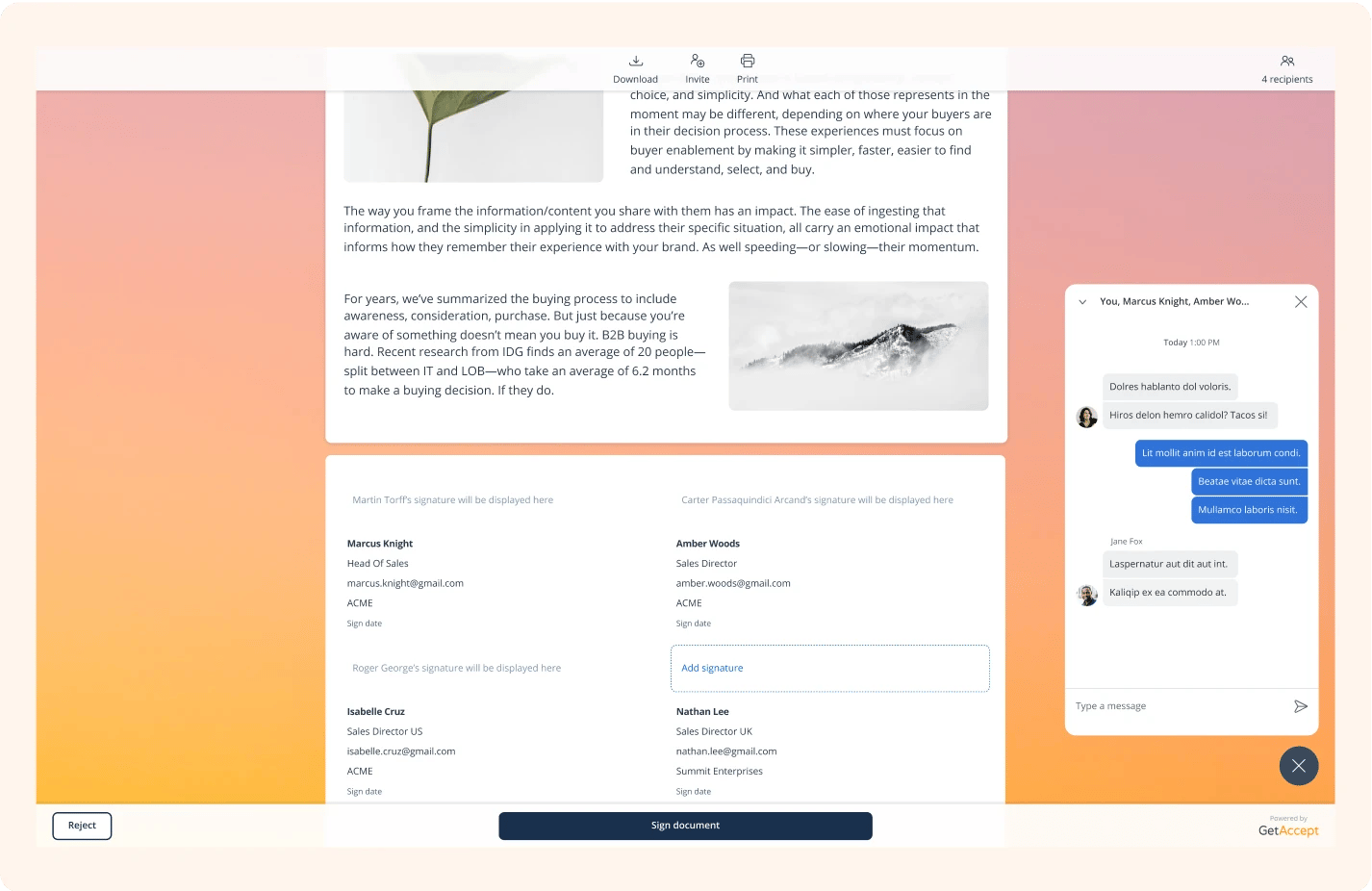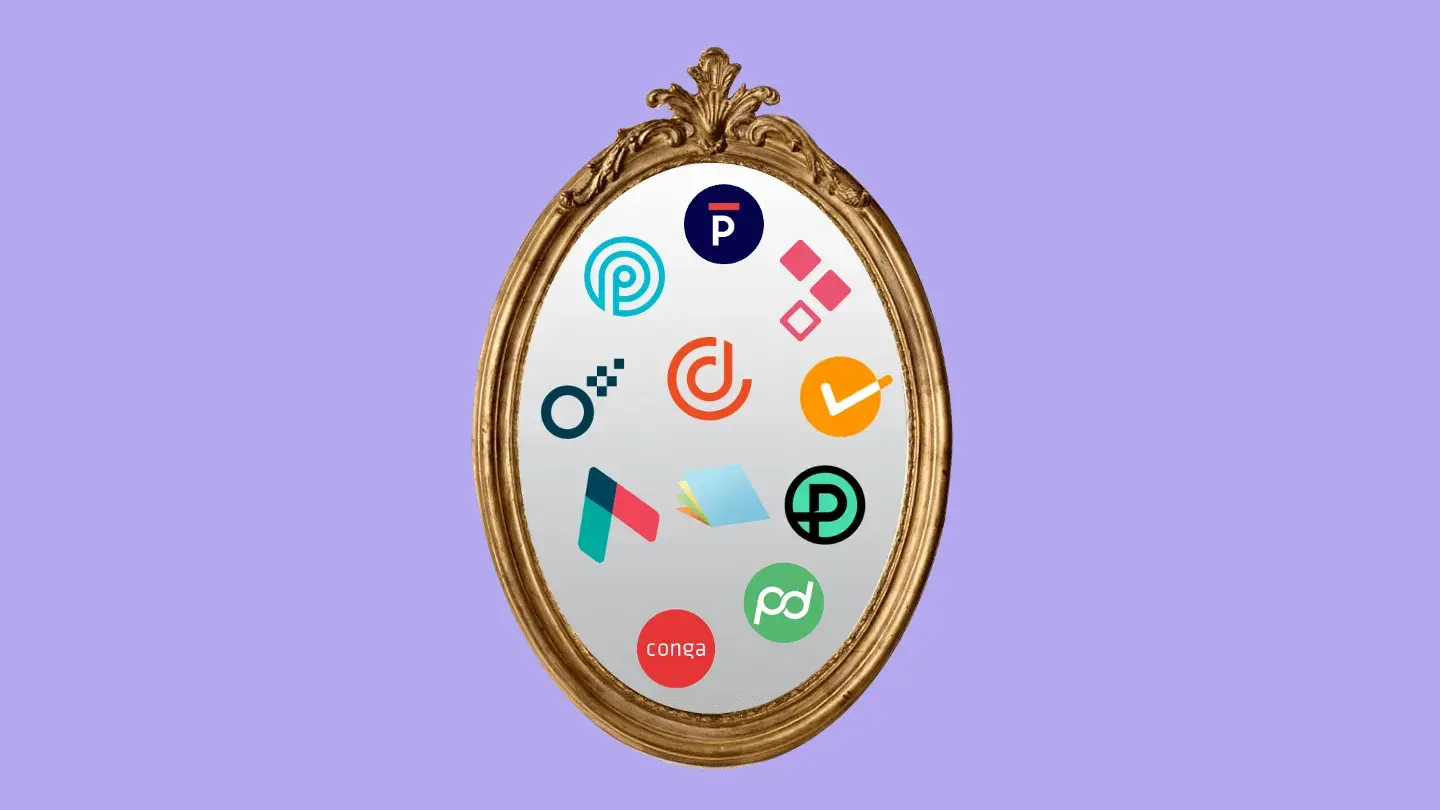Proposal software helps companies win more projects and improve their close rate.
So, it’s no surprise that so many businesses want to leverage the benefits of proposal software.
The trouble is not all proposal software is made equally.
Several types of proposal software are available on the market, each with specific use cases, benefits, and drawbacks.
In this article, we’ll outline the key differences you should be aware of when it comes to selecting the right type of proposal software for your organization.
First, though, let’s bring you up to speed by answering some background questions about proposal software.
What’s driving demand for proposal software?
At its core, proposal software helps businesses design, write, edit, and distribute sales proposals, quotes, and RFP and tender responses.
Managing proposals with dedicated software helps to streamline processes and increase your win rate.
Typical features you should expect to see in any proposal software you choose include:
- CRM integration - to help you track sales progress
- Content creation tools - to help you produce pixel-perfect designs
- Content library - to help you successfully repurpose pre-approved content
- CPQ - to ensure your pricing tables are up-to-date and error-free
- Roles - to make sure the right people are contributing to or reviewing your proposals
- Edit after send - to factor in client feedback in real-time
- Tracking - to see who has opened, read, and engaged with your proposal
- Chat - to communicate easily with stakeholders while they review your proposal
- E-signatures - to quickly gather sign-off on your proposals digitally
- Contract management - to always have the latest version of contracts for each deal

Which kinds of businesses should use proposal software?
If you dig deep enough, you’ll find proposal software that caters to specific niches like accountants, construction companies, or consultants.
The truth is, though, that the best proposal software boasts high-quality features made to work with a wide variety of different industries.
While you may expect proposal software to only be suitable for B2B companies, B2C companies can also see success with proposals.
What are the main types of proposal software?
There are 218 different proposal software options available on G2 - so the choice can be overwhelming if you don’t know where to start.
To help you navigate the different types of proposal software available, we’ve broken them down into 3 core category groups:
- Free vs. paid proposal software
- Single-user vs. multi-user proposal software
- Generalist vs. specialist proposal software
We’ll examine the benefits, drawbacks, and examples of each type of proposal software and compare it to other offerings in that category.
Ready? Let’s dive in.
Free vs. paid proposal software
The simplest way to differentiate the right type of proposal software for your needs is to look at pricing. So, how does free proposal software compare to paid proposal software?
Free proposal software
If you’re just starting out with the idea of adopting proposal software in your business - or you don’t currently write many proposals - then you may like the idea of using free software.
The major benefit of using free proposal software is the opportunity to ‘try before you buy’ and get used to using a handful of basic proposal software features.
However, it’s worth noting that free proposal software is likely to be limited in the features available - which may restrict the impact you’re expecting to see on your proposal process.
In addition, when a product is completely free, it might mean that your data is being used behind the scenes to benefit the software vendor - and this means you become the ‘product.’
Don’t confuse free software with free trials, though, which many reputable companies offer.
Paid proposal software
Investing in the right tool for the job is always a sound business decision - and when it comes to choosing the right type of proposal software, paid software is the preferred option.
Opting to pay for proposal software means you have almost limitless options in terms of the features and integrations available that will complement your proposal processes.
This also means that you can expect the software to be regularly maintained and improved, your data kept secure with regular backups, and product support to be available to help you.
The only downside of using paid proposal software is that you’ll need to find room for it in your operating budget.
Paid proposal software doesn’t cost as much as you think. GetAccept, for example, starts at just $25 per month per user.
![]()
Single vs. multi-user proposal software
Depending on your organization's size, you may consider proposal software priced ‘per user’ and wonder if it’s right for your needs.
So, in this section, we’ll look at single vs. multi-user proposal software.
Single-user proposal software
You may operate a small business or be the only person in your company responsible for proposals - so should you use proposal software?
For the most part, you can get the full benefit from proposal software as a single user.
You’ll still get access to all the incredible features that help you write, design, edit, and distribute proposals to your clients.
However, as a single user, you will lose out on the benefits of collaboration tools built into most leading proposal software platforms that are designed to help you increase productivity.
Multi-user proposal software
In contrast, multi-user proposal software will enable you to get your entire sales team using one platform for easy performance tracking and consistent processes used every time.
That’s not all, though; features like engagement analytics and live chat mean your prospects can become users of the software, too.
This enhanced experience, combined with e-signature technology, will lead to 44% of your documents being signed within 60 minutes and a 51% higher win rate overall.
The only drawback of multi-user proposal software is that it may take longer to adopt across your organization than single-user software. However, the benefits are worth it!

Generalist vs. specialist proposal software
Once you’ve narrowed down your choice between free and paid tools and single-user vs. multi-user proposal software, it’s time to think about your specific use case.
Will generalist proposal software work for you? Or do you need to look at specialist sales or marketing-focused proposal software instead?
Generalist proposal software
If your key focus is presenting a contract or proposal to a customer and collecting their signature with the minimum amount of fuss, then a generalist tool may be right for you.
Generalist proposal software is designed for various industries and offers useful, but often basic, tools for creating, editing, and managing proposals.
Its simplicity means it’s quick to get started with, but it tends to lack more advanced features and integrations to help automate your processes more seamlessly.
You’ll also lose out on specialist features designed to help you improve sales and marketing productivity - as well as more advanced collaboration options.
Examples of generalist proposal software include PandaDoc and Proposify.
Specialist sales proposal software
Ultimately, you’re considering proposal software to help you improve sales performance.
This is where a specialist sales-focused proposal software platform can really shine.
It combines all the best proposal management features - like e-signatures and proposal tracking - in a single digital sales room platform capable of handling deals of any size.
Sales-focused proposal software helps streamline your proposal processes and allows you to collaborate with stakeholders to enhance the customer experience.
On top of this, native-integrations with your CRM and other parts of your technical infrastructure enable you to close more deals more quickly to maximize productivity.
Examples of specialist sales-focused proposal software to consider include GetAccept (that’s us) and Qwilr.
![]()
Specialist marketing proposal software
While proposal software focused on sales will help you close more deals, specialist marketing proposal software concentrates on how proposals are created.
With a focus on managing design and content, specialist marketing proposal software will help you create visually appealing and highly persuasive proposals.
With easy-to-use templates and content libraries, as well as design tools with granular levels of control, marketing-focused proposal software will help make your proposals stand out!
Here’s why that’s important:
Proposals with attractive design are proven to convert 45% better than those that don’t.
However, because of their focus on visual design and content management, marketing-specific proposal software can often lack advanced sales features as a result.
Some of the most popular design or marketing-focused proposal software include Better Proposals and Canva for Proposals.
Conclusion
Choosing the right tool from the various types of proposal software can be challenging.
When you get it right, though, research shows that your business could:
- Spend 53% less time sending proposals
- Send 54% more proposals out to prospects
- Win 59% more deals
Yes, there are multiple types of proposal software to choose from, and the options could be overwhelming for inexperienced software buyers.
However, GetAccept combines all of the very best of generalist, specialist, and multi-user proposal software into one powerful yet easy-to-use, platform. One that’s affordable, too.
With GetAccept, you can manage your entire project proposal management process with features like:
- CRM integration - to connect proposal status with your sales records
- Content creation - to create best-in-class proposals in minutes
- Content library - to select pre-made, pre-approved content for proposals
- CPQ - enabling you to include accurate quotes and pricing in proposals quickly
- Signing order and roles - Get the right people viewing or signing contracts
- Edit after send - update your proposals in seconds based on prospect feedback
- Tracking - easily send proposals directly to prospects and track their interactions
- Chat functionality - clarify points and negotiate with prospects on the go
- Electronic signatures - to get your deals signed off digitally, in real-time
- Contract management - sign and manage contracts digitally with ease
Ready to send your first proposal with GetAccept?
Let us show you around.



